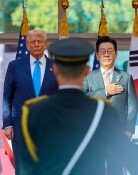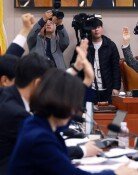Seoul must revamp North Korea policy under Biden era
Seoul must revamp North Korea policy under Biden era
Posted November. 10, 2020 07:37,
Updated November. 10, 2020 07:37
“Washington’s Democratic administrations have the experience of closely working together with the Korean Democratic administrations for our peace-making process,” said Korean President Moon Jae-in Monday, vowing to pool wisdom to boost progress to tackle the North Korean nuclear program. His stressing the alliance of “Democratic administrations” was meant to express his high hopes for the new administration in Washington where Democratic presidential candidate Joe Biden has been elected as new leader. “We believe that things won’t go back to the period of ‘strategic patience’ of the Obama administration,” South Korean Foreign Minister Kang Kyung-hwa said during her visit to the U.S. in apparent hopes for keeping intact the current dialogue mood between Washington and Seoul.
Despite such expectations, the advent of a Biden era calls for a complete overhaul of Seoul’s policy towards North Korea. Admittedly, the president-elect of the U.S. is well versed in Korea, but he is highly critical of President Trump’s North Korea policy. While Mr. Biden once endorsed sunshine policy, the conciliatory strategy adopted by former South Korean President Kim Dae-jung, he turned into a hawk towards Pyongyang after the policy failed. Serving as vice president under the Obama administration, he also witnessed the failure of strategic patience, which was characterized by intentional ignorance against the North that was considered as effective absence of strategies.
A Biden era doesn’t automatically mean reverting back to the same old strategic patience. Having already announced the completion of nuclear weapons development, the North has become an ever-growing threat beyond the patience of Washington. Be it sanctions, pressure, dialogues, or talks, proactive engagement is now essential. Of course, the approach from the new boss of the White House should be entirely different from his predecessor. Top-down summit diplomacy will be a thing of the past. Indeed, Biden has made it clear that a summit-level meeting should be contingent upon the North’s promise on nuclear disarmament.
It is highly likely that the new administration in Washington will take a multilateral approach to bring the North to negotiation tables such as by boosting pressure on the regime through China. The U.S.-North Korea talks will also be a series of predictable conversations proceeding step by step from working-level overtures. Overshadowed by the piles of pending issues at home and abroad in the U.S., North Korea’s nuclear program could readily be put on the back-burner. In the process, Pyongyang might go back to its cycle of brinkmanship, mounting nuclear and missiles provocations to the international community.
The new administration in Washington is asserting a clear departure from the Trump administration. It will put Seoul to a very tough test. This is where my concern stems from; the North Korea policy of the two Democratic administrations in Seoul and Washington could prove cacophonous rather than harmonious as hoped by the Korean president. Seoul must make a swift effort to coordinate with the new team in Washington to work towards their new approach. The first order of business for President Moon is to forgo impatience and stop obsessing with the idea of making something happen in the remaining one and a half years.







